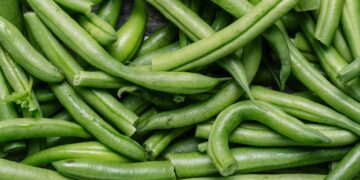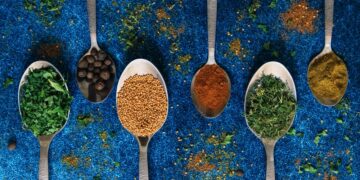Horned melon, scientifically known as Cucumis metuliferus and commonly referred to as kiwano, thorn melon, African horned cucumber, or melano, is a unique fruit indigenous to sub-Saharan Africa. It belongs to the Cucurbitaceae family, which includes cucumbers, melons, and squash. This exotic fruit, with its vibrant orange skin adorned with horn-like spikes, not only captivates with its appearance but also boasts an array of health benefits that make it a valuable addition to any diet.
Nutritional composition
Horned melon is celebrated for its impressive nutritional content, offering a plethora of vitamins, minerals, and antioxidants.
a. Vitamins
- Vitamin C: Horned melon is particularly rich in vitamin C, with a 100-gram serving providing approximately 34% of the recommended daily intake (RDI). Vitamin C is a potent antioxidant that supports immune function, collagen synthesis, wound healing, and iron absorption.
- Vitamin A: This fruit contains significant amounts of vitamin A in the form of beta-carotene, which is essential for vision health, immune function, and skin health.
- Vitamin B6: Horned melon is a good source of vitamin B6, which plays a crucial role in metabolism, nervous system function, and the synthesis of neurotransmitters.
- Vitamin B9 (Folate): Folate, or vitamin B9, found in horned melon, is vital for DNA synthesis, cell division, and fetal development during pregnancy.
b. Minerals
- Potassium: Horned melon is rich in potassium, an electrolyte that helps regulate blood pressure, fluid balance, muscle contractions, and nerve signals.
- Magnesium: This mineral is essential for energy production, muscle function, bone health, and the regulation of blood sugar and blood pressure.
- Calcium: While not as abundant as in dairy products, horned melon contains some calcium, which is crucial for bone and teeth health, muscle function, and nerve transmission.
c. Antioxidants
- Carotenoids: Horned melon contains various carotenoids, including beta-carotene, lutein, and zeaxanthin, which act as antioxidants and have been linked to reduced risk of chronic diseases such as cancer and cardiovascular disease.
- Flavonoids: These compounds possess antioxidant and anti-inflammatory properties, contributing to overall health and well-being.
d. Dietary fiber
Horned melon is a good source of dietary fiber, with approximately 1.8 grams per 100 grams. Fiber aids in digestion, promotes satiety, regulates blood sugar levels, and supports heart health.
e. Water content
With its high water content, horned melon is hydrating and helps maintain proper hydration levels in the body, especially in hot climates or during periods of physical activity.
f. Other nutrients
- Protein: While not a significant source of protein, horned melon provides a small amount, contributing to overall nutrient intake.
- Fat: Like most fruits, horned melon is low in fat, making it a healthy option for those watching their fat intake.
Health benefits of horned melon
The health benefits of horned melon are numerous and diverse, owing to its rich nutritional profile and bioactive compounds.
a. Boosts immune system
- Vitamin C boost: Horned melon is a powerhouse of vitamin C, with a 100-gram serving providing about 34% of the recommended daily intake. Vitamin C is renowned for its role in supporting the immune system by stimulating the production and function of white blood cells, which are crucial for defending the body against infections and illnesses.
- Antioxidant action: In addition to its immune-boosting properties, vitamin C in horned melon acts as a potent antioxidant, scavenging harmful free radicals and protecting immune cells from oxidative damage. This antioxidant activity helps to strengthen the immune response and may reduce the risk of chronic diseases.
b. Supports heart health
- Potassium regulation: Horned melon is rich in potassium, an essential mineral that plays a key role in regulating blood pressure and supporting heart function. Potassium helps to counteract the effects of sodium, promoting vasodilation and reducing the risk of hypertension, heart attacks, and strokes.
- Magnesium magnificence: Magnesium, another prominent mineral in horned melon, contributes to heart health by regulating heart rhythm, supporting muscle function, and improving blood flow. Adequate magnesium intake is associated with a lower risk of cardiovascular diseases.
- Fiber’s role: The fiber content in horned melon also benefits heart health by helping to lower cholesterol levels, improve blood sugar control, and reduce inflammation, all of which are important factors in maintaining cardiovascular wellness.
c. Promotes digestive health
- Fiber fortification: Horned melon is a rich source of dietary fiber, with approximately 1.8 grams per 100 grams. Fiber adds bulk to stool, promotes regular bowel movements, and prevents constipation. Moreover, soluble fiber in horned melon acts as a prebiotic, nourishing beneficial gut bacteria and supporting digestive health.
- Gut microbiome support: The fiber and water content in horned melon also aid in maintaining a healthy balance of gut bacteria, which is essential for digestion, nutrient absorption, and immune function. A thriving gut microbiome is associated with reduced risk of gastrointestinal disorders and improved overall well-being.
d. Improves skin health
- Collagen support: Vitamin C in horned melon is vital for collagen synthesis, a process that maintains the structure and elasticity of the skin. Collagen is a key protein that provides strength and resilience to the skin, reducing the appearance of wrinkles, fine lines, and sagging.
- Antioxidant defense: The antioxidants in horned melon, including vitamin C and carotenoids, protect skin cells from oxidative damage caused by UV radiation, pollution, and other environmental stressors. This antioxidant action helps to prevent premature aging, sunburn, and skin cancer, while promoting a youthful and radiant complexion.
e. Supports eye health
- Carotenoid content: Horned melon is rich in carotenoids such as lutein and zeaxanthin, which are concentrated in the retina and help to protect against age-related macular degeneration, cataracts, and other vision disorders.
- Antioxidant protection: The antioxidant properties of carotenoids in horned melon safeguard the delicate structures of the eye from oxidative damage, reducing inflammation and preserving visual acuity. Regular consumption of horned melon may contribute to long-term eye health and vision maintenance.
f. Aids weight management
- Satiety support: Horned melon is low in calories but high in fiber, making it a filling and satisfying food choice. Fiber helps to increase satiety, reduce hunger, and control appetite, which can aid in weight management efforts by promoting a feeling of fullness and preventing overeating.
- Metabolic boost: The vitamins, minerals, and antioxidants in horned melon support metabolic function, energy production, and fat metabolism, which may further contribute to weight loss or weight maintenance goals when combined with a balanced diet and regular physical activity.
g. Reduces inflammation
The flavonoids, carotenoids, and other phytonutrients in horned melon exhibit anti-inflammatory properties, modulating inflammatory pathways and reducing the production of pro-inflammatory molecules. This anti-inflammatory action may alleviate symptoms associated with inflammatory conditions such as arthritis, asthma, and inflammatory bowel disease, while promoting overall health and well-being.
h. Hydrates the body
With its high water content (about 90% by weight), horned melon is an excellent hydrating food choice. Proper hydration is essential for maintaining fluid balance, regulating body temperature, lubricating joints, and supporting various physiological processes. Consuming hydrating foods like horned melon can help prevent dehydration and promote overall health, particularly in hot climates or during vigorous physical activity.
i. Enhances bone health
While not as abundant as dairy products, horned melon contains some calcium, a mineral essential for bone formation, strength, and density. Adequate calcium intake, along with vitamin D and other nutrients found in horned melon, supports optimal bone health and helps prevent osteoporosis and fractures, especially in older adults.
j. Provides antioxidant protection
Horned melon is rich in antioxidants, including vitamin C, carotenoids, and flavonoids, which neutralize harmful free radicals and reduce oxidative stress in the body. By combating oxidative damage, antioxidants help to prevent cellular aging, DNA mutations, and chronic diseases such as cancer, diabetes, and heart disease.
Incorporating horned melon into your diet
Incorporating horned melon into your diet is not only a delicious way to enjoy its unique flavor but also a fantastic opportunity to reap its numerous health benefits.
- Fresh and simple: Enjoy horned melon in its purest form by scooping out the juicy pulp with a spoon. Simply slice the fruit in half lengthwise and scoop out the flesh. You can sprinkle a pinch of salt or drizzle with honey for added flavor.
- Fruit salad: Add diced horned melon to your favorite fruit salad for a burst of color, flavor, and nutrition. Combine it with other tropical fruits like pineapple, mango, papaya, and kiwi for a refreshing and vibrant dish.
- Smoothies and juices: Blend horned melon with other fruits such as bananas, strawberries, and oranges to create delicious smoothies and juices. You can also add a handful of leafy greens like spinach or kale for an extra nutrient boost.
- Salsas and chutneys: Incorporate finely chopped horned melon into homemade salsas and chutneys for a sweet and tangy twist. Combine it with tomatoes, onions, cilantro, lime juice, and jalapenos for a refreshing salsa that pairs well with grilled fish or chicken.
- Yogurt parfait: Layer diced horned melon with Greek yogurt, granola, and honey to create a nutritious and satisfying parfait. This makes for a delicious breakfast or snack option that’s packed with protein, fiber, and vitamins.
- Frozen treats: Blend horned melon with coconut water or fruit juice and freeze it into popsicles for a refreshing summer treat. You can also blend it with yogurt and freeze it into homemade sorbet or ice cream.
- Salads and grain bowls: Add sliced horned melon to salads and grain bowls for an unexpected burst of flavor and texture. It pairs well with leafy greens, quinoa, couscous, nuts, and seeds.
- Cocktails and mocktails: Use horned melon as a garnish for cocktails and mocktails to add a tropical flair to your drinks. You can also muddle it with fresh herbs like mint or basil for added flavor.
- Grilled or roasted: Grill or roast slices of horned melon for a caramelized and smoky flavor. Serve it as a side dish or dessert, or add it to sandwiches, wraps, or burgers for a unique twist.
- Baked goods: Incorporate pureed horned melon into baked goods such as muffins, bread, cakes, and tarts for a moist and flavorful texture. It adds a subtle sweetness and a vibrant color to your baked treats.
Precautions and considerations
While horned melon offers a plethora of health benefits, it’s important to be aware of certain precautions and considerations when incorporating this exotic fruit into your diet.
- Allergies: Individuals with latex allergies may experience cross-reactivity to horned melon, as it belongs to the same plant family (Cucurbitaceae) as latex-producing plants like bananas, avocados, and chestnuts. If you have a latex allergy, exercise caution when consuming horned melon and monitor for any adverse reactions such as itching, swelling, or difficulty breathing.
- Potassium content: Horned melon is relatively high in potassium, which is beneficial for most individuals but may pose a risk to those with kidney problems or individuals taking medications that affect potassium levels. If you have kidney disease or are on medications that affect potassium levels, consult with your healthcare provider before adding horned melon to your diet.
- Moderation: Like all foods, horned melon should be consumed in moderation as part of a balanced diet. While it offers numerous health benefits, excessive consumption may lead to gastrointestinal discomfort or digestive issues, particularly for individuals not accustomed to high-fiber fruits.
- Pesticide residues: As with other fruits and vegetables, horned melon may contain pesticide residues if not organically grown. To minimize exposure to pesticides, consider purchasing organic horned melon or thoroughly wash and peel conventionally grown fruits before consumption.
- Storage and handling: Horned melon should be stored at room temperature until ripe, after which it can be refrigerated to extend its shelf life. Handle the fruit with care due to its spiky exterior, and wash it thoroughly before cutting to remove any dirt or contaminants from the surface.
- Interactions with medications: Certain medications, such as potassium-sparing diuretics and ACE inhibitors, may interact with high-potassium foods like horned melon, potentially leading to hyperkalemia (elevated blood potassium levels). If you are taking any medications, especially those affecting potassium levels, consult your healthcare provider before adding horned melon to your diet.
- Individual sensitivities: Some individuals may experience digestive discomfort, such as bloating or gas, when consuming horned melon, particularly if they are not accustomed to high-fiber fruits. If you notice any adverse reactions after consuming horned melon, consider reducing your intake or avoiding it altogether.
Conclusion
Horned melon stands out not only for its striking appearance but also for its exceptional nutritional profile and array of health benefits. Whether enjoyed fresh, blended into smoothies, or incorporated into various recipes, this exotic fruit offers a delicious and nutritious addition to any diet. By incorporating horned melon into your culinary repertoire, you can savor its unique flavor while reaping the numerous health rewards it has to offer.


































































































































































































